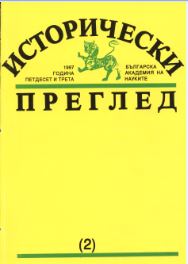За унгаро-българския таен комитет на Янош Асталош от 1870 г.
The Hungarian-Bulgarian Secret Committee of Janos Asztalos of 1870
Author(s): Penka PeikovskaSubject(s): History, Political history, Modern Age, 19th Century
Published by: Институт за исторически изследвания - Българска академия на науките
Summary/Abstract: An attempt is made in the article, on the basis of newly discovered documents of the Hungarian National Archives in Budapest to clarify some questions connected with the founding, goals and activity of a “Hungarian-Bulgarian Secret Committee” established in Vidin in 1870 by the Hungarian emigre Janos Asztalos. Janos Asztalos settled in Vidin in mid-September 1870 after escaping from the prison in Vac were he was jailed for his revolutionary activity as leader of the movement of the poor peasants in the Alfold Plain against the alliance between Austria and Hungary. During his stay in Vidin (up to the end of March 1870) J. Asztalos became the initiator of the setting up of the clandestine committee. He took this step on account of the upsurge in the Southslav movement on Austro-Hungarian and Turkish territory which took place after the outbreak of the Dalmatian Uprising and the hope to prepare a common revolutionary action. The Committee was formed in early January 1870 with centre in Vidin and a branch in Shumen. It emerged as an organization of the Hungarian emigres, followers of Lajos Kossuth, who lived in the Bulgarian towns on the Danube. Notwithstanding the absence of direct documentary evidence, the Bulgarian participation in the Committee as a project and probably also as Asztalos’ initial attempts should not be questioned since at that time revolutionary groups existed in Bulgaria. At the beginning of April 1870 J. Asztalos left for Bucharest where he contacted the Romanian Liberals (the “Red”) and attended a meeting of “Foreign republican emissaries” (including probably also Bulgarians, supporters of the “Young”) who discussed common action and the possibility of establishing a Danubian Confederation. The activity of the Hungaria-Bulgarian Secret Committee died away after the forced remaining of Aszatalos in Constantinople in April 1870. Irrespective of its short-lived existence it was important with its historic presence in the national-liberation movement in the Balkans because it personified the attempt in the struggle for independence to rally the efforts of the Hungarian opponents of dualism with the Bulgarian Revolutionary Movement and with the political plans of the Romanian Liberals.
Journal: Исторически преглед
- Issue Year: 1997
- Issue No: 2
- Page Range: 70-83
- Page Count: 14
- Language: Bulgarian
- Content File-PDF

